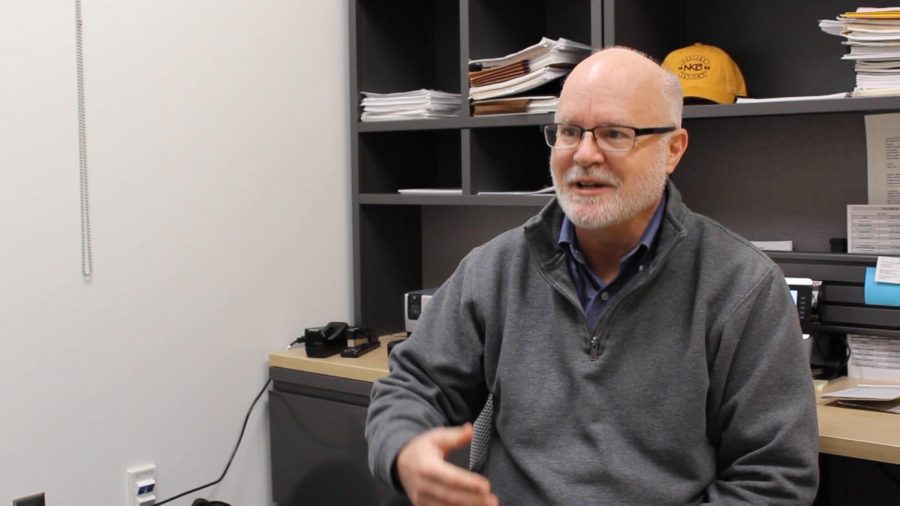Degree program encourages students to pursue their passion
Integrative studies allows students to gives students flexibility in the future.
February 7, 2020
It’s the fourth largest major within the College of Arts and Sciences with approximately 260 students, yet no one seems to know about it.
Integrative studies has transitioned from a major aimed at helping undecided students graduate on time to a major focused on encouraging students to explore what truly interests them, according to the program’s director, associate professor of philosophy Dr. Rudy Garns.
“It’s a way of finding yourself in college rather than having to wait to try to catch up,” Garns said.
Established about 15 years ago, integrative studies offers three degree programs, including an Associate’s, Bachelor’s and Master of Arts Degree (A.A., B.A. and M.A.).
The integrative studies B.A. program consists of three required integrative studies classes—one introductory course taken during their first semester as an integrative studies major and two classes taken in conjunction with the senior capstone project.
In addition to mandatory courses, students also choose three focus areas. Each must consist of four upper-level courses. During their final semester, students are expected to create a capstone project that explains how all of their focuses are connected.
Rhonda Davis, an integrative studies instructor who teaches all three of the undergraduate integrative studies courses, said that the skills learned within the mandatory classes are interdisciplinary and can be applied to all occupations.
“It’s not like we’re just teaching content, we’re providing skills, frameworks that we can apply to whatever problems you might face in the world, in your communities, in your jobs,” Davis said.
Before students can graduate and apply what they learn, they begin by meeting every semester with Amanda Laskowski, an advisor for A.A. and B.A. integrative studies to design their own customized degree plans.
“Because every student has an individualized degree plan combining three unique minors and focus areas, advising is a really critical part of that process,” Laskowski said.
Despite the stereotype that integrative studies is a program for those that are unsure of what they want to do when they graduate, Rachel Zlatkin, an integrative studies instructor in the master’s program, said that she has observed just the opposite.
“These are students who know exactly what they want, and what they want is a range that allows for adaptability and flexibility,” Zlatkin said.
For senior Megan Bradford, adaptability and flexibility is what she needed. Bradford, an integrative studies major through the adult learner’s program, focuses on English, psychology and human services.
According to Bradford, it was her Introduction to Integrative Studies class that helped her make the transition from a student that had no idea what career to choose to a student with a developed plan. Bradford said she plans to get into public administration to help people with disabilities, mental health issues and physical disabilities by creating laws and programs.
Because the degree plans are unique to every student, some have had enough flexibility in their plans to have additional credit hours to take classes of interest to them that may be outside of their focuses.
Senior integrative studies major Grace Beck, who has focuses in communication, psychology and English, said that the program has given her the opportunity to dabble in performing arts and a few additional business classes. According to Beck, integrative studies has enabled her to take ownership and initiative in her own education, which was really important to her.
“There’s so many things I wish I could be investing in and integrative studies let me make those choices and maximize my inputs of time and energy for the maximum outputs in my education,” Beck said.
In addition to the flexibility the program provides, Garns believes that diversity of experience makes a person better at handling real-world challenges.
“When you talk to employers out there, they’re saying they want people with a skill set with competencies, soft skills. They don’t want a person that can solve problems, they want a person that can think through problems and know where to find solutions and see a bigger picture,” Garns said.
Garns believes students should choose a career that reflects who they are and what they care about, and whatever they choose to do, they should enjoy doing it. Garns said he wants the concept of pursuing what you are passionate about to be the heart of integrative studies. When he was first starting out with the program, he asked students to help create a tagline that represented the major’s values.
““Pursue your passion” was the agreed-upon tagline … because that’s really what I want. I want them to not just think about the job ahead. Figure out who you are and design a college program for you,” Garns said.

